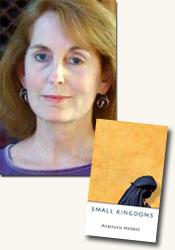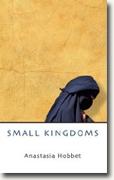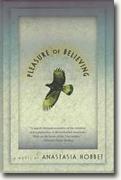author interview
book reviews:
· general fiction
· chick lit/romance
· sci-fi/fantasy
· graphic novels
· nonfiction
· audio books
· author interviews
· children's books @
curledupkids.com
· DVD reviews @
curledupdvd.com
newsletter
win books
buy online
links
home
for authors
& publishiss
for reviewers

|
|||||
 
Contributing editor Luan Gaines spoke recently with author Anastasia Hobbet about her latest novel, Small Kingdoms, her depiction of intertwined political/social/religious aspects of domestic life in Kuwait between Gulf Wars, the near-slavery plight of immigrant workers, and renewing the world in a few pages. Interviewer Luan Gaines: What was your inspiration for Small Kingdoms Anastasia Hobbet: I returned to the States in 2000, after five years in Kuwait, with a short story featuring two of the book’s main characters, Theo and Hanaan. I didn’t take the story any further until a couple of years after 9/11, when I found the media coverage of the Arab world painfully one-sided—implying that almost all Arabs were terrorists. No normal Arab life was depicted in the American media, no matrons with kids, no employment, no grocery stores, no homework, no mothers-in-law, no women cooking in the kitchen, and I saw that I was in a position to tell a much deeper, truer story. In addition, I needed to make sense of my experiences there, and writing about it is the only way I know. What is the political situation in Kuwait at the beginning of the novel? At the beginning of the novel, the first Gulf war is a handful of years in the past and the next one is just over the horizon. Saddam Hussein is still in power and unappeased, threatening a second invasion of Kuwait.
Immigrant workers are often dependent upon their incomes to send back to families in their native countries. Does this dependency increase their vulnerability in a society that barely “sees” them? Absolutely, especially among domestic workers, who are paid a pittance. They work in isolation, shut inside the private homes of Kuwaitis, and many are stripped of their visas and passports. Kuwait’s labor laws, which are weak at best, don’t even apply to the country’s 600,000 immigrant domestic workers—they’re excluded from the law—giving a tacit message of official approval to the current practices by employers. If that isn’t slavery, I don’t know what is. When three housemaids are murdered over a short period of time, their deaths are virtually ignored by the authorities. Why? Does this reaction by authorities put all other housemaids at risk? The murders I profile in the book were taken directly from the English-language Kuwaiti newspapers. Why don’t Arab societies address this problem with outraged determination? It’s not a problem exclusive to Kuwait. Perhaps it’s due to the same reasons we Americans turned with criminal slowness against slavery, outlawing it only five decades after England’s ban on the Atlantic slave trade. We were addicts; our economy had flourished on slave labor and become dependent upon it, both North and South.
Emmanuella is fortunate to work for Mufeeda, but the housemaid is regularly terrorized by the other servants. What is the hierarchy in this household, and what will happen to Emmanuella if she is caught stealing food? Wealthy Kuwaiti households typically employ a large number of servants, and they’re rarely all of one nationality. A Sri Lankan nanny might care for the children, while Indians and Filipinos clean the house and cook the food. The gardeners might be Pakistani or Iraqi or Syrian. Differences in religion and upbringing become magnified in the microcosm of the world such a household becomes, and servants look for any advantage they can find.
Mufeeda prides herself on her care for her servants, and she treats them judiciously. At the same time, because she’s so wealthy, she doesn’t share their concerns and she’s blind to their troubles. Even Emmanuella’s obvious illness escapes her notice for a long while. Mufeeda’s concern and tolerance for Emmanuella’s mistakes reflect her own vulnerability to her mother-in-law’s temper. Her mother-in-law-challenges Mufeeda’s government of the household by disliking Emmanuella simply because Mufeeda hired her. Emmanuella becomes their battlefield. A modern woman, Mufeeda lives a traditional life, respectful of her religion and family traditions. What is her relationship with her troublesome mother-in-law? Her physician husband? Mufeeda dislikes her petty, meddlesome mother-in-law while at the same time pitying her for her advanced diabetes and her loss of a beloved son in the first Gulf war. The power struggle between them is a bit of a cliché in the Arab world, but that doesn’t make it less painful for the women involved. With her husband, Saleh, Mufeeda has always had a warm and tender relationship, despite the fact that theirs is an arranged marriage. The trust between them founders, though, when Mufeeda begins to suspect that Saleh is having an affair and—worse—has few religious convictions. Emmanuella’s behavior is unusual of late, Mufeeda worries that her favorite maid will attract the mother-in-law’s attention. What is Emmanuella doing that puts her at risk? Emmanuella is ill, but neither she nor Mufeeda realize it until late in the book. She has become weak and clumsy, and suffers a deep fatigue that no amount of sleep can cure. She has trouble handling the kitchen knives; she breaks dishes and decorative items, and she’s grown very thin, to the point of boniness. The mother-in-law doesn’t see her illness either, and wouldn’t credit it if she did. She blames Mufeeda for hiring an incompetent servant. A rigid class system is an important ingredient in Small Kingdoms It’s the turning point for Mufeeda in the book, when she sees beyond her own concerns, her own class status, the requirements and repressions of her own society, and recognizes what that system of utter wealth and privilege has done to the housemaid next door. If they are caught helping the servant next door, who will suffer the most serious consequences, Mufeeda or Emmanuella? Emmanuella, no doubt. Mufeeda would be mocked and scorned by her peers, punished for disobeying a rigid, unwritten social contract, an idea that terrifies her. But Emmanuella would lose her livelihood, the only support for her widowed mother and siblings back in Goa, India. The next-door maid is fortunate that Emmanuella has noticed her dilemma, but is Emmanuella’s concern an anomaly in this society? What might be the usual fate of such a girl? During my five years in Kuwait, I stood close to a situation similar to the one I write about in Small Kingdoms Hanaan, a Palestinian, is a “bidoon.” What does this term mean? While resentful of the Muslim religion’s limitations on women, Hanaan still honors her father. Can you explain this family dynamic? What are her father’s feelings towards his rebellious daughter? ‘Bidoon’ means ‘without’ in Arabic, and the term refers to stateless Arabs: without a homeland, without citizenship. This is opposed to the word ‘Beduin’ –the name for the desert nomads of the Arabian peninsula, who are no longer nomadic. Hanaan is a bidoon from a mixed-blood Palestinian background. Though she has lived in Kuwait all her life, she is not a citizen, and has few civil rights.
Even though he’s from California, a place with a stultifying, ever-growing bureaucracy, (it’s my home too) Theo’s never seen anything to match Kuwait’s. He’s not prepared for the high art of delay and procrastination, nor for the elaborate rhetoric that goes along with it, which is partially a result of Arabic’s oblique, calligraphic nature. He does settle in, due in part to his warm friendship with Saleh, a medical colleague, and his developing love for Hanaan, his Arabic tutor.
Is it unusual that Theo is attracted to Hanaan? What are the risks for each of them? Would anything but a clandestine relationship ever be possible for this couple? Hanaan is an intelligent, independent, beautiful woman. Many men would find her attractive, particularly Western men. To Kuwaiti men (I’m speaking in very general terms) she’d be attractive as a woman, a lover, but not so much as a wife. She’s too bold and rebellious, unwilling to be like other women. There’s also this: few Kuwaiti parents would choose her as a match for their sons.
In a classic scene in Small Kingdoms Most American expat women learn to restrain their native liveliness and noise when they’re out in public in the Arab world. But when you get a big group of them together, all bets are off. They revert back fast to home ground. Even on their best behavior, they seldom match the demeanor of Kuwaiti women, who are reserved, dignified, and quiet in public, seldom raising their voices. I remember one time sitting in the women-only waiting area of a medical laboratory for some routine tests. Around me were a dozen Kuwaiti women in head-to-toe black. I couldn’t see a single face. Feeling like a nun at prayer, I sat silently among them—and slowly realized that several whispered conversations were going on around me. Kit, an American, is recently arrived in Kuwait, a fish out of water in her new environment. Why is Kit unable to adjust or avail herself of the servants she has been allotted? Why does Kit feel that she can communicate with Mufeeda? In what way is Kit like Mufeeda, if any? Kit grew up on a farm in Oklahoma and went to a provincial religious college. She’s shy, unsophisticated, and she’s never been outside the U.S. before. Her background is utterly democratic. When she was a girl, her father’s farm hands sat at the table with the family, and she and her mother did all the housework. No one in her circle of family and friends had ever had a ‘servant.’ The idea is totally alien to her. She’d have to be ill—unable to do her own work—to justify having a maid.
Class and culture are important in Small Kingdoms At the end of five years in Kuwait, I could write with fair comfort about either culture, though I continually reminded myself how often I was bewildered by my own. That kept me humble, I hope. My biggest challenge came in writing from Mufeeda’s perspective. She’s almost wholly unlike me, and in the beginning I didn’t like her much, probably because she was one-dimensional. But as I fleshed her out and inhabited her head, I came to love her—and, I think, understand her choices. As the threat of invasion by Saddam increases the Americans consider leaving the country. How does this constant threat impact your characters and their reactions? Are they likely to be more reckless or more cautious? I went through the partial evacuation I describe in the book. My husband and I chose not to leave. We don’t have children, so our decision could be made for us alone, as adults. For Kit, who has two small children, there’s no other prudent choice but to leave. A devastating war is only a few years in the past, and she has almost no stake in the country. She chooses caution for the best of reasons. For Theo, it’s a different matter. He’s in love with Hanaan, and Kuwait is her home. She stayed in country during Saddam’s occupation and she’d stay put again—so he’ll stay too.
What will an invasion by Saddam mean for the immigrant population? Does their situation become more precarious as the city grows more anxious? Yes. During the first Gulf war, many servants were left behind by fleeing Kuwaitis to guard villas and businesses, and were stranded when Saddam’s forces cut off the routes of escape. The seven-month occupation was brutal. There were many stories of hunger, robbery and rape in the immigrant worker community. When Saddam threatened again, the stories of rape from the first war terrified the maids in Kuwait. What did you find the most difficult in writing Small Kingdoms This was difficult: I’ve written what may seem, superficially, to be a novel critical of Arabs, Muslims, and Kuwait, and I’ve worried that I’d offend Muslims. It’s taken me some time to see—and be convinced that others would see in the book—my love of the Arab culture, and my respect and fondness for Kuwaitis. The fact that readers and reviewers do see this has been wonderfully rewarding. Are you currently working on another novel? If so, can you share something about it with us? I wrote my third novel in between drafts of Small Kingdoms Anastasia Hobbet lived in Kuwait for five years between the two Gulf Wars, where she studied the language, art and culture of the Islamic world and traveled widely around the Middle East, India and North Africa. A former freelance journalist, she is the author of a previous novel, Pleasure of Believing. She lives in the San Francisco Bay area. Contributor Luan Gaines interviewed author Anastasia Hobbet, author of Small Kingdoms (see accompanying review), about her book for curledup.com. Luan Gaines/2010.
|
|||||
| fictionnsf/f · comic books · nonfiction · audio newsletter · free book contest · buy books online review index · links · · authors & publishiss reviewerss |
|
| site by ELBO Computing Resources, Inc. | |


